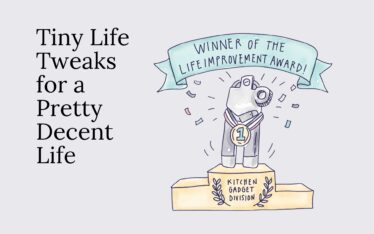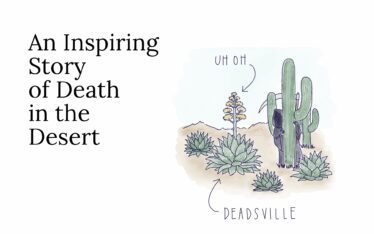Some of the most alive clients I’ve worked with are the ones who have been awakened by the alarm clock of death. (For the record, they pressed the snooze button. They’re still alive and kicking after being jolted out of complacency.)
Ava, for example, survived breast cancer* with a new lease on life, with a renewed sense of purpose and aliveness. She came to me for coaching to “make the most of this fresh start I’ve been given. I’m going to live right this time”, she said. She put an end to the routine and indifference in her life and is now outrageously appreciative for every sunset, every eye roll from her teenager, every simple pleasure.
And then there’s Gregg, who fell off a ladder hanging holiday decorations on his roof. After waking from a coma (and surviving endless ribbing from his brothers about the giant inflatable Santa who took him down), he said he had officially woken up to his life. He looked back on the pre-Santa years as time he took for granted, in autopilot mode. He systematically overhauled the way he spent his time in and out of work, using his newfound awakening as a reset button he didn’t know he needed.
The favor of death.
Death sometimes does us a favor and introduces itself to us in advance: it invites itself over unannounced for the weekend (“we’re sorry, but the tumor is malignant”), makes a total mess (i.e.: chemo, radiation and shattered assumptions about life), then leaves us to clean up after it (putting the pieces back together, hopefully liberated with a newfound lust for life). Dalliances with death undeniably act as the ultimate wake-up call. Finding ourselves on the precipice– on the edge of whatever we believe to be in store for us when the undertaker calls– is a rare event that most of us will never experience. But for those who have, they’ve seen the light (so to speak) and are living brighter because of it.
Think of anyone you might know who has had a close call with death— maybe someone who has grappled with a dire diagnosis. Maybe you’re thinking of someone who made it out alive from a car accident where the doctor said, “wow… if the damage had just been an inch to the left…”, and then made the keel-over-and-die move. Have you not noticed how on purpose these people are, after emerging from what psychologists have called “the roar of awakening”? Study after study shows how these people wake up to their lives with fresh eyes— with clarified priorities and profound attitude adjustments about the ways they want to live their lives.
Ava, Gregg, and others who have intimate relationships with death seem to know something that the rest of us don’t. Why can’t those of us– the supposedly lucky ones who haven’t had one foot in the grave– feel that same sense of urgency, motivation and desire to LIVE? Or can we? If we count the number of Mondays we have left and get in touch with our temporality, can we appreciate life more? I say yes. Read on for ideas.
Observations of those who have looked death in the eye.
Unlucky (or lucky, depending on your perspective) people who have survived close brushes with death reportedly experience the following:
- Reorganizing priorities to diminish trivial issues– like worrying about being late for a meeting or whether barbeque sauce has too much sugar in it. People recovering from significant illness, for example, typically laser in on what they deem to be the important things in life– like people that matter, revitalizing their interests, etc. What trivial things do you need to dismiss? What priorities need to bubble up to the top?
- Greater immersion in their lives– people tend to really participate in their lives when they’re made hyper-aware of their expiry dates. Death-brushed clients I have worked with have learned how to play the flute, traveled to Pakistan, started their own business, re-fallen in love with their work. Where do you need to show up ready to play in your life?
- Mindfully living in the present moment– whether it’s fantastical or craptastical. Are you present, even now?
- Appreciating even the most mundane day-to-day occurrences– like the feel of warm water in a bath, the smile from a stranger, and the smell of spring in the air. What perfectly average thing are you overlooking right now? That you get to have Bugles for lunch? Celebrate the shit out of that.
- Shedding the expectations they believe society places on them– after flirting with death, people appear to grant themselves the permission to live in ways that are more authentically them. Imagine what your life might look like if you were the real you, in every setting?
- Creating depth + meaning– getting close to death or experiencing traumatic events don’t necessarily make us happier, but survivors do consistently report more of a sense of purpose, more self-actualization, increased self-awareness, and more wisdom in life. Where do you need to develop a refreshed attitude toward your life, to find it even a little more meaningful?
- Rebirths– respondents in a survey of people who had close encounters with death (near drownings, falls, car accidents, and serious illnesses) appear to undergo “rebirths” into newly enhanced lives, notably described as full of aliveness. I want a life described as full of aliveness, don’t you?
It’s clear: people who have looked death in the eye (while squinting, like an eclipse) adopt a no-nonsense approach to the business of living like they mean it. That’s what we’re after—the wake-up call that illuminates the value of life, without the drama of the near-death experience.
Chances are high that death won’t give you a courtesy call, breathing into your phone with a warning to “live, or else”. You likely won’t get a second chance, a reset button. No, you’re gonna need to manually press the reset button yourself. Read the obituaries for a week. Maybe walk through a graveyard. Or try writing your obituary. Go hog wild and buy a cemetery plot. Imagine your time is up. Envision the end and tap into the questions above to live like you’ve been warned you won’t live forever.
*Fifty three percent of cancer patients participating in a study admitted that they felt better adjusted in their lives as a result of experiencing cancer.







